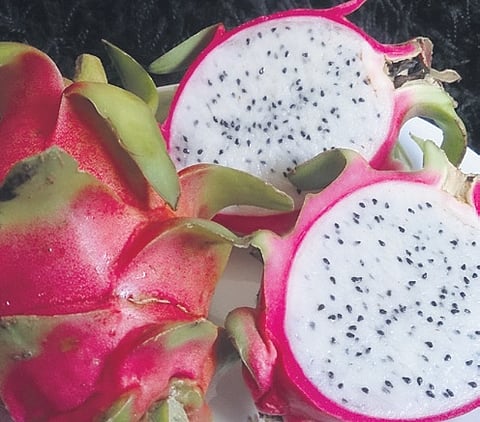

BENGALURU: In a bid to support farmers who are adopting the cultivation of dragon fruit (also known as Red Kamalam) on a large scale, the Indian Institute of Horticultural Research (ICAR-IIHR) in Hesaraghatta has developed a new method to produce ‘dragon fruit powder’ that cuts production costs by over 50 per cent, while improving its nutritional quality.
One of the most popular products made from dragon fruit is the ‘powder’, which is commonly used in ice creams, milkshakes, cakes, and biscuits to impart a magenta pink hue. However, the commercial value of the powders are quite high, with spray-dried powder priced at around Rs 4,000 per kg and freeze-dried powder between Rs 12,000 and Rs 15,000 per kg.
Dr CK Narayana, Principal Scientist (Horticulture) at the Division of PHT &AE, ICAR- IIHR, explained that the prices of the powder are typically high because of equipment – as it is produced using freeze-drying or spray-drying methods and the use of additives that reduce the amount of actual fruit pulp in the powder – with 20-40 per cent maltodextrin added as an additive.
However, IIHR developed a technology that uses only 4-8 per cent additives and utilises cabinet or tray-drying techniques. As a result, the production cost is significantly lower, and the nutritional quality is improved due to the reduced use of additives.
Converting surplus dragon fruit into powder form helps farmers extend the shelf life of their produce and reduce the immediate supply of fresh fruit in the market. This also helps prevent a potential price drop due to oversupply. The conversion allows farmers to store and sell the powder over a longer period, stabilising prices and ensuring a consistent income even when fresh fruit prices might fluctuate.
The Centre, recognising the growing demand for dragon fruit – considered as a superfruit due to its high nutrient content - has also approved the establishment of a Centre of Excellence for the fruit at IIHR-CHES in Hirehalli, under the Mission for Integrated Development of Horticulture. To further enhance the fruit’s market potential, ICAR-IIHR too has started researching ways to preserve, process, and add value to Kamalam.